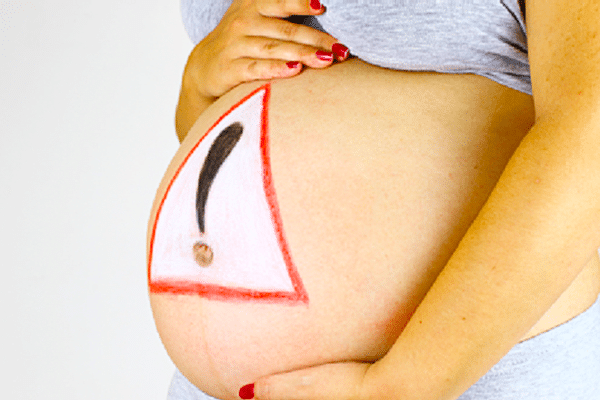10 Common Pregnancy Discomforts and Ailments

Unfortunately pregnancy isn’t always as stress-free and easy as you might imagine. That was a joke. But it does bring with it some problems, ailments and nasty surprises that women are not aware of. Here we present the most common ailments and discomforts that you can expect to have at some point during your pregnancy. And don’t let any of them put you off. You just need to be prepared and ready to deal with them. We have left morning sickness off this list as we cover this in more depth separately.
Frequent Urination
This is one off the earliest signs of pregnancy. It is not just the fact that your uterus is expanding and putting more pressure on your bladder but also changes in hormone levels cause an increased blood flow to the kidneys which result in faster bladder filling.
Our Tip
Avoiding diuretics such as tea and coffee.
Lean forward during urination to try to empty the bladder as much as possible.
Vaginal Discharge
You can expect to see higher volumes of either odourless or mild-smelling milky discharge. This is as a result of higher oestrogen levels and more blood flow in the vaginal area.
Our Tip
If the mucus produced is definitely not from an infection, then there is nothing that can be done other than to use panty-liners to help to absorb it.
Yeast Infection
During your pregnancy the higher levels of the hormone oestrogen create the ideal environment for yeast production in the vagina to rise to abnormal levels. Vaginal candidiasis or Thrush are very common during pregnancy and will not affect the health of the baby in any way.
Our Tip
Wear loose fitting cotton underwear / sleep without underwear / Keep area as clean and dry as possible throughout the day and night.
Varicose Veins
During pregnancy the small veins near the surface of the skin bulge and become visible. They usually look like small purple squiggly lines and are caused by an increased amount of blood that the veins have to push back to the heart from the extremities of the body. The uterus places extra pressure on the main abdominal vena cava vein. This restricts the return flow from the legs.
Whilst they can be very unsightly the good news is that they often disappear after delivery.
Our Tip
Regular exercise / elevate feet as often as possible / sleep on your left side / avoid sitting for long amounts of time.
Bleeding Gums
A very common problem during pregnancy which is caused by changes in hormone levels. Brushing and flossing causes the gums to bleed easily as they are already very tender. Pregnancy tumours, which are safe and usually painless, can occur pretty much anywhere on the body during pregnancy but most commonly the occur in the mouth.
Our Tip
Brush softly and floss very gently if at all. You might want to refrain from flossing during pregnancy if your gums are particularly tender and sore. Opt for professional removal of plaque at your dentist or dental hygienist.
Nose Bleeds
An increase in blood supply means more pressure is exerted on the blood vessels inside the nose. Although harmless they can be very annoying and embarrassing if you are in a public area at the time.
Our Tip
Keep well hydrated by drinking lots of fluids / blow your nose very gently if you have a cold or running nose.
Itchy Skin/ Stretch Marks
As your bump expands your skin naturally stretches this causes the skin in this area to become quite itchy. Often skin dries up during pregnancy too and you may find that you develop eczema. If you already suffer from eczema or psoriasis you might find that it worsens. Some women experience itchy palms and soles of their feet. It remains unknown as to the reason for this but it is most likely due to hormonal levels.
Our Tip
Wear loose fitting clothes / keep skin moisturised / Try to avoid going outside in hot and humid conditions / Avoid scratching / Use cold flannels and compresses with the irritated areas.
Gas and Bloating
Expect higher than normal levels of trapped gas, belching and flatulence during your pregnancy. Higher levels of the hormone progesterone causes the digestion process to slow and therefore allow for more gasses to be released from the digesting food. Eating a high carbohydrate and fatty diet with certain vegetables can cause some people to produce higher levels of gas and should be avoided. Others may experience similar effects from dairy products. It is important that you know your body and which foods usually give you flatulence.
Our Tip
Alter your diet to include more foods that keep flatulence to a minimum.
Constipation
During pregnancy an increase in the hormone progesterone causes the movement of food through the digestive tract to slow. This in turn often leads to constipation. As the uterus expands and grows further pressure is exerted on the bowels. Constipation can be very uncomfortable and painful at times so it is best to take every opportunity to prevent it occurring.
Our Tip
Eat a high fibre diet with lots of fruits, vegetables and grains / Drink up to 10 cups of water per day / Use stool softeners in extreme cases.
Haemorrhoids
This isn’t very nice at all and many women get ‘Piles’ for the first time in their lives during pregnancy. Similarly to varicose veins, the blood vessels in the rectal area can become swollen at this time. They can be itchy or very painful. They will often occur as a result of heavy ‘pushing’ to pass a stool. Delivery is also a time when haemorrhoids may occur.
Our Tip
Avoid constipation by eating a high fibre diet / drink lots of water / Do not over-strain during bowel movements / do Kegel exercises which will not only strengthen the vaginal muscles but also the rectal muscles which will reduce the chances of getting piles / Use cold (ice packs) and warm (bath) treatments to soothe the pain and discomfort in the area.
